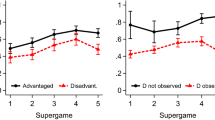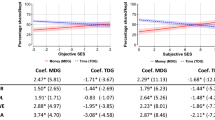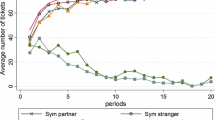Abstract
Increasing research evidence indicates that economic inequality leads the rich to be less generous than the poor. While compelling, the underling mechanism of the finding remains elusive. We conduct a laboratory experiment to investigate how inequality influences people’s behavior in a sharing game. We test varying causes of inequality to see how people share payoffs with others when inequality is caused respectively by chance, competition, and choice. The experiment result shows that the rich give less than the poor only when inequality is self-chosen. Yet, different from findings in previous studies, increasing inequality does not reinforce, but instead mitigates the negative relationship of income and giving. Our study suggests that research on the consequences of inequality should be careful on discerning whether self-choice of inequality could account for the spurious effect of inequality on people’s prosocial behavior.




Similar content being viewed by others
Notes
Source: Central intelligence agency of the U.S.
In the pre-survey, we only showed the relative positions of the five actors along the payoff spectrum. The exact payoff for each position, as shown in Fig. 1, was however not disclosed to enrolled participants. In other words, what they viewed is a general picture of the distributions, and not detailed payoffs for each position.
In fact, only less than 1% of the enrolled participants wrongly pointed out that case i is more unequally distributed than case ii in Fig. 1.
The 266 participants were playing the role of the dictator (giver) in the experiment. We additionally recruited N = 122 participants to be the dictatees (recipient). As many of the dictator participants chose to give zero payoff to the dictatee, we did not recruit an equal number of dictatees to the experiment.
We follow Arai (2011) to cluster the standard errors of the regression coefficients.
We thank a reviewer for the suggestion.
The result also shows no difference in task performance between the “random” treatment and the other treatments, suggesting that participants did not underperform despite knowing that their performance was unrelated to how much they would receive for payoffs in the experiment.
The question of whether men are more competitive than women remains inconclusive in social science research. While substantial research findings in experimental economics show that men tend to choose more competitive payment schemes than women do in experiments (Buser et al. 2014; Niederle and Versterlund 2011), evidence from social psychological research using different measurements of competitiveness, such as the SOV test employed in our study, does not find a significant difference between men and women in competitiveness (Balliet et al. 2011; Buunk and Massar 2012). Thus, the fact that we did not find men to be more competitive than women in our experiment cannot be seen as an anomaly of the participants recruited to our study.
We thank a reviewer for this comment.
References
Arai, M. (2011). Cluster-robust Standard Errors Using R. http://www.ne.su.se/polopoly_fs/1.216115.1426234213!/menu/standard/file/clustering1.pdf.
Babones, S. J. (2008). Income inequality and population health: Correlation and causality. Social Science and Medicine, 66(7), 1614–1626.
Baland, J. M., Pranab, B. K., & Bowles, S. (Eds.). (2007). Inequality, cooperation, and environmental sustainability. Princeton, NJ: Princeton University Press.
Balliet, D., Li, N. P., Macfarlan, S. J., & Van Vugt, M. (2011). Sex differences in cooperation: A meta-analytic review of social dilemmas. Psychological Bulletin, 137(6), 881–909.
Barker, J. L., & Barclay, P. (2016). Local Competition increases people’s willingness to harm others. Evolution and Human Behavior, 37(4), 315–322.
Benenson, J. F., Pascoe, J., & Radmore, N. (2007). Children’s altruistic behavior in the dictator game. Evolution and Human Behavior, 28(3), 168–175.
Boix, C. (2010). Origins and persistence of economic inequality. Annual Review of Political Science, 13, 489–516.
Buser, T., Niederle, M., & Oosterbeek, H. (2014). Gender, competitiveness, and career choices. The Quarterly Journal of Economics, 129(3), 1409–1447.
Buunk, A. P., & Massar, K. (2012). Intrasexual competition among males: Competitive towards men, prosocial towards women. Personality and Individual Differences, 52(7), 818–821.
Charness, G., & Villeval, M. C. (2017). Behavioural economics: Preserving rank as a social norm. Nature Human Behaviour, 1, 0137.
Cheung, F., & Lucas, R. E. (2016). Income inequality is associated with stronger social comparison effects: The effect of relative income on life satisfaction. Journal of Personality and Social Psychology, 110(2), 332–341.
Côté, S., Houser, J., & Willer, R. (2015). High economic inequality leads higher-income individuals to be less generous. Proceedings of the National Academy of Sciences, 112(52), 15838–15843.
Daly, M. (2016). Killing the competition: Economic inequality and homicide. New Brunswick: Transaction Publishers.
Duffy, J., & Kornienko, T. (2010). Does competition affect giving? Journal of Economic Behavior & Organization, 74(1), 82–103.
Engel, C. (2011). Dictator games: A meta study. Experimental Economics, 14(4), 583–610.
Erkal, N., Gangadharan, L., & Nikiforakis, N. (2011). Relative earnings and giving in a real-effort experiment. The American Economic Review, 101(7), 3330–3348.
Fairbrother, M., & Martin, I. W. (2013). Does inequality erode social trust? Results from Multilevel Models of US States and Counties. Social Science Research, 42(2), 347–360.
Fetchenhauer, D., Flache, A., Buunk, A. P., & Lindenberg, S. (Eds.). (2006). Solidarity and prosocial behavior: An integration of sociological and psychological perspectives. New York: Springer.
Fischbacher, U. (2007). Z-Tree: Zurich toolbox for ready-made economic experiments. Experimental Economics, 10(2), 171–178.
Gornick, J.C., & Milanovic, B. (2015). Income inequality in the United States in Cross-National Perspective: Redistribution revisited. Luxembourg Income Study Center. http://www.gc.cuny.edu/CUNY_GC/media/CUNY-Graduate-Center/PDF/Centers/LIS/LIS-Center-Research-Brief-1-2015.pdf?ext=.pdf. Accessed May 4, 2015.
Gottschalk, P., & Smeeding, T. M. (1997). Cross-national comparisons of earnings and income inequality. Journal of Economic Literature, 35(2), 633–687.
Jacobs, L. R., & Soss, J. (2010). The politics of inequality in America: A political economy framework. Annual Review of Political Science, 13, 341–364.
Kawachi, I., Kennedy, B. P., Lochner, K., & Prothrow-Stith, D. (1997). Social capital, income inequality, and mortality. American Journal of Public Health, 87(9), 1491–1498.
Keister, L. A., & Moller, S. (2000). Wealth inequality in the United States. Annual Review of Sociology, 26, 63–81.
Korndörfer, M., Egloff, B., & Schmukle, S. C. (2015). A large scale test of the effect of social class on prosocial behavior. PLoS ONE, 10(7), 1–48.
Kraus, M. W., Piff, P. K., Mendoza-Denton, R., Rheinschmidt, M. L., & Keltner, D. (2012). Social class, solipsism, and contextualism: How the rich are different from the Poor. Psychological Review, 119(3), 546–572.
Kuziemko, I., Buell, R. W., Reich, T., & Norton, M. I. (2014). Last-place aversion’: Evidence and redistributive implications. The Quarterly Journal of Economics, 129(1), 105–149.
Lancee, B., & Van de Werfhorst, H. G. (2012). Income inequality and participation: A comparison of 24 European countries. Social Science Research, 41(5), 1166–1178.
Lanzetta, J. T., & Englis, B. G. (1989). Expectations of cooperation and competition and their effects on observers’ vicarious emotional responses. Journal of Personality and Social Psychology, 56(4), 543–554.
Levy, F., & Murnane, R. J. (1992). U. S. Earnings levels and earnings inequality: A review of recent trends and proposed explanations. Journal of Economic Literature, 30(3), 1333–1381.
Loughnan, S., Kuppens, P., Allik, J., Balazs, K., De Lemus, S., Rafael Gargurevich, R., et al. (2011). Economic inequality is linked to biased self-perception. Psychological Science, 22(10), 1254–1258.
McCall, L., & Percheski, C. (2010). Income inequality: New trends and research directions. Annual Review of Sociology, 36, 329–347.
Niederle, M., & Versterlund, L. (2011). Gender and competition. Annual Review of Economics, 3, 601–630.
Nishi, A., & Christakis, N. A. (2015). Human behavior under economic inequality shapes inequality. Proceedings of the National Academy of Sciences, 112(52), 15781–15782.
Norton, M. I., & Ariely, D. (2011). Building a better America—One wealth quantile at a time. Perspectives on Psychological Science, 6(1), 9–12.
Payne, K. B., Brown-Iannuzzi, J. L., & Hannay, J. W. (2017). Economic inequality increases risk taking. Proceedings of the National Academy of Sciences, 114(18), 4643–4648.
Piff, P. K., Kraus, M. W., Côté, S., Cheng, B. H., & Keltner, D. (2010). Having less, giving more: The influence of social class on prosocial behavior. Journal of Personality and Social Psychology, 99(5), 771–784.
Piff, P. K., Stancato, D. M., Côté, S., Mendoza-Denton, R., & Keltner, D. (2012). Higher social class predicts increased unethical behavior. Proceedings of the National Academy of Sciences, 109(11), 4086–4091.
Schurr, A., & Ritov, I. (2016). Winning a competition predicts dishonest behavior. Proceedings of the National Academy of Sciences, 113(7), 1754–1759.
Stephany, F. (2016). Who are your Joneses? Socio-specific income inequality and trust. Social Indicators Research. https://doi.org/10.1007/s11205-016-1460-9.
Subramanian, S. V., & Kawachi, I. (2004). Income inequality and health: What have we learned so far? Epidemiologic Reviews, 26(1), 78–91.
Tavoni, A., Dannenberg, A., Kallis, G., & Löschel, A. (2011). Inequality, communication, and the avoidance of disastrous climate change in a public goods game. Proceedings of the National Academy of Sciences, 108(29), 11825–11829.
Thye, S. R., & Lawler, E. J. (Eds.). (2009). Altruism and prosocial behavior in groups. Bingley: Emerald Group Publishing Limited. https://doi.org/10.1108/S0882-6145%282009%2926.
Tobin, J. (1958). Estimation of relationships for limited dependent variables. Econometrica, 26(1), 24–36.
Trautmann, S. T., Van de Kuilen, G., & Zeckhauser, R. J. (2013). Social class and (un) ethical behavior: A framework, with evidence from a large population sample. Perspectives on Psychological Science, 8(5), 487–497.
Uslaner, E. M., & Brown, M. (2005). Inequality, trust, and civic engagement. American Politics Research, 33(6), 868–894.
Van Lange, P. A. M. (1999). The pursuit of koint outcomes and equality in outcomes: An integrative model of social value orientation. Journal of Personality and Social Psychology, 77(2), 337–349.
Wilkinson, R. G., & Pickett, K. E. (2006). Income inequality and population health: A review and explanation of the evidence. Social Science and Medicine, 62(7), 1768–1784.
Wilkinson, R. G., & Pickett, K. E. (2009). Income inequality and social dysfunction. Annual Review of Sociology, 35, 493–511.
Williams, R. J., Volberg, R. A., & Stevens, R. M. (2012). The population prevalence of problem gambling: Methodological influences, standardized rates, jurisdictional. Guelph: Ontario Problem Gambling Research Centre.
Acknowledgements
We appreciate the financial support of the “Direct Grant” provided by the Faculty of the Social Sciences of the Chinese University of Hong Kong.
Author information
Authors and Affiliations
Corresponding author
Rights and permissions
About this article
Cite this article
Chiang, YS., Chen, J.C. Does Inequality Cause a Difference in Altruism Between the Rich and the Poor? Evidence from a Laboratory Experiment. Soc Indic Res 144, 73–95 (2019). https://doi.org/10.1007/s11205-018-2029-6
Accepted:
Published:
Issue Date:
DOI: https://doi.org/10.1007/s11205-018-2029-6







